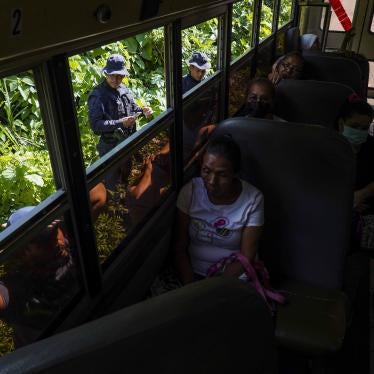In a stinging report released in Lima today, Human Rights Watch/Americas condemned torture by Peruvian soldiers and police, a practice it termed a persistent feature of the country's efforts to eliminate two leftist guerrilla groups and combat common crime. At the same time, the government of President Alberto Fujimori has undermined officials in the attorney general's office and court system who might have served as a check against these abuses, and has seemed to encourage attacks against politicians and journalists who have denounced them. Torture and Political Persecution in Peru notes that the widespread abuses typical of prior years, including "disappearances" and arbitrary detentions, have tapered off as the government has gained the upper hand in its fight against the guerrillas, but it lambasts what it labels a "routine" and "institutionalized" security force policy to torture. The recent and most welcome abolition of so-called faceless courts, an abusive system used to try cases of terrorism, will not eliminate torture unless further reforms are implemented, according to the report, which contains detailed recommendations for the Peruvian and United States governments.
"Well-documented episodes of torture have been accompanied by a steady erosion of the powers of key constitutional bodies entrusted with the defense of human rights," commented Jose Miguel Vivanco, executive director of Human Rights Watch/Americas. "In addition, the press and politicians have come under attack for criticizing human rights abuses committed by the Fujimori government," he added.
Torture and Political Persecution, released in English and Spanish, details the role of torture in the government's counterinsurgency strategy, including an egregious operation mounted by the military in response to the December 1996 occupation of the residence of the Japanese ambassador by the T£pac Amaru Revolutionary Movement (Movimiento Revolucionario T£pac Amaru, MRTA). In March of the following year, before army commandos broke into the ambassador's residence and released seventy-one of the hostages held by the guerrillas, the Peruvian army detained more than forty coffee growers in Alto Yurinaki, where they believed the MRTA guerrilla column responsible for the attack had originated. Based on interviews with victims and witnesses, Human Rights Watch/Americas determined that the army tortured almost all of the detainees in an attempt to force them to incriminate themselves and their neighbors as members of the MRTA. The army variously beat them, submerged them in tanks of water, made them stand without food in the sun for hours, and shocked them with electricity. Authorities later ordered the release of all but one of the detainees for lack of evidence.
Torture in Peru takes place within a framework of counterinsurgency measures that both facilitate such abuses and shelter them from discovery or sanction, according to the report. Detainees suspected of what Peruvian law defines as terrorist offenses may be held incommunicado by Peru's anti-terrorist police for up to ten days without a court order. At the same time, the Fujimori government has weakened autonomous public bodies designed to ensure that justice is administered fairly and in accordance with the law and human rights principles, including the Constitutional Court and the Office of the Attorney General.
In parallel with executive branch actions undermining the authority and autonomy of governmental watchdogs, journalists and politicians who have reported on or criticized torture have suffered a series of attacks. Baruch Ivcher Bronstein, for instance, a naturalized Peruvian citizen, was forced by the government to give up his majority ownership in Channel 2 television as well as his Peruvian citizenship after the station broadcast news that intelligence officials had tortured one of their own agents in the basement of army headquarters in Lima. Film shot secretly in the military hospital showed the fingers and ankles of the agent, Leonor La Rosa, inflamed and scarred from burns reportedly inflicted with a blowtorch. La Rosa had been under investigation after secret intelligence plans to intimidate journalists and members of the opposition were leaked to the press. Meanwhile, Congress, dominated by Fujimori's Cambio-90 party, has stalled on plans to introduce laws expressly prohibiting torture.
The report contains recommendations for both the Peruvian and United States governments.
The government should institute an immediate and impartial investigation into the use of torture in Alto Yurinaki in March 1997. Military personnel responsible for torture and those responsible for the operation during which it occurred should be disciplined and prosecuted. The results of the inquiry should be made public, and compensation and an official apology should be provided to the victims.
The crime of torture should be individually and specifically included in the Penal Code with penalties appropriate to its seriousness.
Although the armed forces lack authority to conduct interrogations of civilian suspects, they regularly do so. This should be clearly prohibited, and those who breach the prohibition should be sanctioned.
The Office of the Attorney General of the Nation should take measures to improve the vigilance of provincial prosecutors in preventing the occurrence of torture, and prosecutors who fail to attend interrogations and searches should be disciplined and sanctioned.
The government should investigate thoroughly and impartially the abductions and violent attacks on members of the press, politicians, and other public personalities documented in this report. Those responsible for these crimes should be prosecuted and punished.
The Clinton administration should suspend all assistance to Peru's National Intelligence Service, which has reliably been reported to be involved in numerous human rights violations, including a campaign of harassment of the press and illegal phone-tapping. The United States should publicly distance itself from the SIN's de facto chief, Vladimiro Montesinos, who is widely perceived in Lima to enjoy Washington's support.
The administration should seek support from other members of the United Nations for the assignment of a special rapporteur or an independent expert to monitor and publicly report on the human rights situation in Peru.






